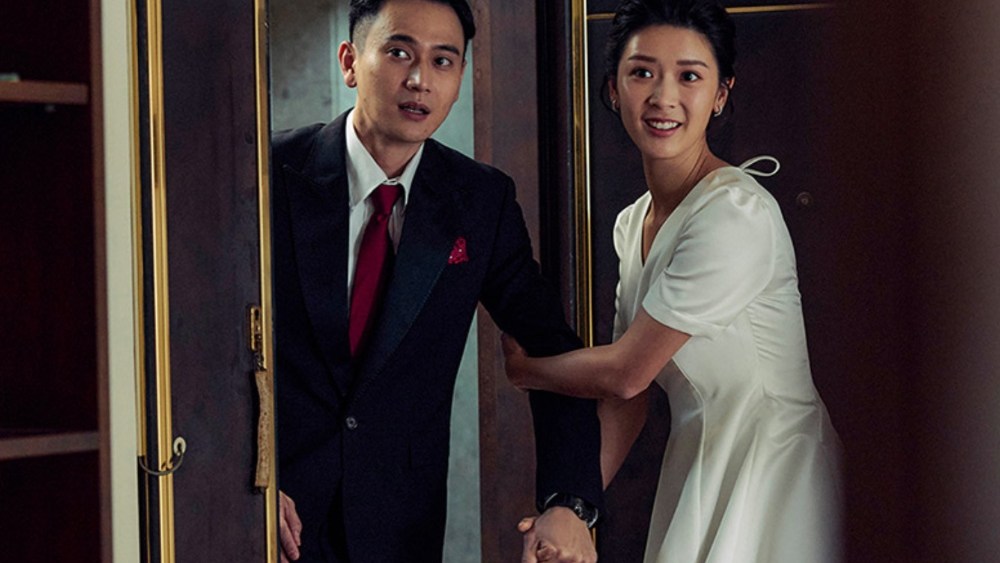In Chinese culture, “double happiness” refers to an ornamental design commonly found festooned across wedding ceremonies, formed by placing two copies of the Chinese character for joy next to each other. In doing so, it forms a kind of hybrid character, one that literally doesn’t mean anything, but is accorded a certain significance for how it handily represents the intended satisfaction of both bride and groom, and by extension their families. Such a conundrum is clearly on the mind of Taiwanese director Joseph Chen-Chieh Hsu, whose film “Double Happiness” uses an absurd premise — a couple holds two weddings at the same time in order to appease the groom’s parents — as a means of bringing out all manner of familial tensions, with decidedly mixed results.
Tim Kao (Kuang-Ting Liu) is the high-strung head chef at the Grand Hotel in Taipei, who is about to be married to Daisy Wu (Jennifer Yu). Having experienced his parents’ divorce at a young age, he has constantly tried to appease and cater to both sides of his family for many years, which has resulted in his most ambitious and foolhardy plan to date.
After Tim’s dentist father Frank (Chung Hua Tou) refuses to allow his ex-wife, successful CEO Carina Bai (Kuei-Mei Yang), to attend the wedding ceremony and reception, the groom resolves — with the extensive coordination of Daisy, her family, his coworkers and wedding planner Regina (singer-turned-actor 9m88) — to hold two weddings on the same day at the hotel, with bride, groom and father-in-law (Tenky Tin) shuttling back and forth between the two while the guests remain none the wiser.
Aside from a brief prologue establishing Tim’s first literal inklings of his love of food in the midst of his grief over his parents’ separation, this surprisingly long film takes place over the course of this single chaotic day. It initially operates in a pseudo-“Birdman” vein, using a percussive score and long tracking shots following people through hallways as they attempt to solve the latest crisis: the last-minute addition of a champagne tower, a typhoon delaying a key member of the wedding ceremony, and the difficulties of obtaining fresh cuttlefish ink, the pasta dish that initially brought Tim and Daisy together at his restaurant.
Hsu, who made his directorial debut with the well-received drama “Little Big Women” in 2020, handles the comparative frothiness of these scenes ably, though the constant introduction of new characters into the maelstrom tends to flatten them out into types rather than shedding additional light onto the supposed loved ones of the bride and groom.
“Double Happiness” certainly has its share of more overtly manufactured acts of stupidity, though some of it can be chalked up to the film’s seemingly comic aims. Where it truly runs into trouble, however, is in its gradual infusion of drama until it completely overwhelms the proceedings. The memories stirred up by the momentous occasions of the day begin to manifest for Tim as flashbacks where he sees and interacts with his younger self (Robinson Yang), reliving an especially traumatic day when he went to the hotel and tried to pry his mother away from an important meeting. This heart-tugging mode quickly becomes the main emotional tenor of the film in its last 45 minutes, as Tim becomes more and more morose during the dueling receptions, with an especially ill-advised move into surrealism.
Though Liu — who previously won a Golden Horse award for Chung Mong-hong’s melodrama “A Sun”
(2019) — acquits himself in some of the comic setpieces, his screen presence is generally recessive in a way that favors drama, and the effort only serves to highlight how much Daisy’s role is ultimately downplayed in favor of Tim’s reveries and attempts to come to terms with his parental relationships.
One of the most interesting aspects of “Double Happiness” comes courtesy of its sometimes
counterproductive yet cinephile-minded casting. Kuei-Mei Yang, one of Tsai Ming-liang’s greatest actresses, brings a natural, pained warmth to proceedings that counterbalances some of Liu’s more forced moments. Tenky Tin, so memorable in Stephen Chow’s “Shaolin Soccer” and “Kung Fu Hustle,” appears here as Daisy’s well-meaning, astrology-obsessed father. But the most significant of all comes in the form of the Grand Hotel itself which, in addition to its real-life glamor, is the workplace of the master chef father in the Yang-starring “Eat Drink Man Woman” and the site of the wedding reception in Edward Yang’s masterpiece “Yi Yi.”
The staircase used so prominently in that latter film — which also featured a pregnant bride, superstitions surrounding the day of the wedding, and a title formed by combining two Chinese characters — is seen time and again here, and the invocation of such a daringly modern film, one in which sentimentality is balanced by a rigor of form and lived-in portraiture of each generation’s failings and hopes, makes the plot machinations and attempted pathos of “Double Happiness” feel all the more limited by comparison.

